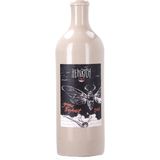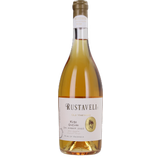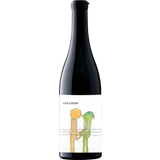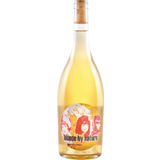Orange Wine: What Lies Behind this Fascinating Wine
Orange Wine is not for the faint-hearted.
Orange wine is not for the faint-hearted. Here you can find out what makes this wine so special, how it is made and why it is considered the fourth colour of wine - somewhere between white, red and rosé. Orange wine - not for the faint-hearted
What is orange wine?
Orange wine - sometimes also called "amber wine" or "skin-contact wine" - is a wine that is technically made from white grapes, but is produced like a red wine. The difference: during production, the grape skins remain in contact with the must for weeks, resulting in a stronger colour, more structure and a completely new taste experience. The colour ranges from dark gold to rich orange - hence the name.
If you are familiar with the classic types of wine, you can find an overview of the most important grape varieties here.
History & origin
The concept of orange wine is far from new. In fact, wine has been produced for over 5,000 years in Georgia using large clay vessels called "qvevris," which are buried in the ground. This ancient winemaking technique is still employed today and is regarded as the foundation of the modern orange wine movement.
In recent years, winegrowers in Italy, especially in Friuli, Slovenia, and Austria, have rediscovered this traditional technique. The result is wines that showcase entirely new facets—powerful, independent, and often slightly wild.
How orange wine is made
During the production of white wine, the grape skins are not immediately separated from the juice; instead, they are fermented together. This method is known as mash fermentation. Although it is typically used for red wine, it can also be applied to white wine and may last from several weeks to months. During this fermentation period, colouring agents, tannins, and aromas are released from the grape skins, contributing to the wine's distinctive colour and structure.
Winemakers often avoid using additional yeasts or fining agents during production and practice biodynamic methods. Many orange wines are matured in clay amphorae, a technique that further emphasises the earthy, natural character of the wine.
Sensory characteristics: colour, aroma & taste
- Colour: from amber to deep orange
- Aroma: dried fruit, herbs, honey, tea or nuts
- Palate: complex, dry, with a noticeable tannin structure
- Character: rustic, exciting and extremely versatile
Differentiation: orange wine, natural wine & amphora wine
Orange wine is often confused with natural wine and amphora wine; however, these are three different categories that can overlap.
Orange wine refers to a production method where white wine is fermented with the grape skins. The colour and flavour result from the extended contact with the skins.
Natural wine represents a philosophy focused on minimal intervention in viticulture. This includes practices such as spontaneous fermentation, using little to no sulfur, and avoiding fining or filtering. While many orange wines are considered natural wines, not all of them fall into this category. There are also orange wines that are intentionally stabilised and filtered.
Amphora wine refers to the type of wine that is aged in amphorae, which are traditional clay vessels. When orange wine is fermented or aged in these clay amphorae, also known as Qvevris, it is specifically called amphora wine. However, it's important to note that there are also white and red wines that can be matured in amphorae without being classified as orange wines.
So you could say that an orange wine can be a natural wine and an amphora wine - but it doesn't have to be. The decisive factor is which winemaking technique, philosophy and containers the winemaker chooses.
Well-known grape varieties & regions
Almost any white grape variety can be made into orange wine. Pinot Grigio, Sauvignon Blanc, Ribolla Gialla, Chardonnay and Muscat are particularly popular. In Austria, winegrowers from Burgenland, Südsteiermark and Kamptal provide exciting interpretations. Internationally, Friuli, Slovenia and Georgia are regarded as centres of the orange wine style.
Food pairing & serving suggestions
Orange wines are excellent food pairings - especially with spicy dishes, oriental cuisine, lamb, curry or mature cheese. Thanks to their tannic structure, they harmonise perfectly with intense dishes where classic white wines would often be too light.
Tip: Best enjoyed slightly chilled at around 12-15 °C - and always from a large glass so that the flavours can unfold.
Criticism & appeal of orange wines
Orange wines are polarising; some people love their unadulterated, natural character, while others find them unusually tart or "rustic." However, this is precisely what makes them exciting: they are unique, honest, and always tell a story. By getting involved, you'll discover a whole new world of wine.
Conclusion
Orange wine is not just a passing trend; it represents a revival of traditional winemaking methods with a contemporary twist. This type of wine has a rugged quality that adds to its unique character. At 9wines, we believe it is one of the most exciting developments in the wine world in recent years, and it is definitely not for the faint-hearted.
Here you can find our white wines - including exciting orange wines from winemakers who show courage and character.
Frequently asked questions about orange wine
Is orange wine the same as natural wine?
Not necessarily. Many orange wines are natural wines, but not all. Orange refers to the production, natural wine to the philosophy behind it.
How long does fermentation with the skins take?
Depending on the style and winemaker, mash fermentation takes between a few days and several months. The longer, the more intense the colour and flavour.
Why is orange wine cloudy?
Many winemakers deliberately avoid filtration in order to give the wine more naturalness and texture. This is completely normal and not a quality defect.
Related products
-
 4.8 (5)
4.8 (5)Gernot Heinrich Organic Graue Freyheit 2022, 0,75 L
- Natural wine from the amphora
- Pinot Blanc, Pinot Gris, Chardonnay
- Fermented on the skins for 2 weeks
€ 29,99 (€ 39,99 / L)Delivery by March 03
-
-

Shilda Winery Rustaveli - Kisi Qvevri 2022, 0,75 L
- Traditional orange wine from the Kisi variety
- Fermented on the skins in amphorae
- Clean, delicately cloudy, intense fruit flavours
€ 16,99 (€ 22,65 / L)Delivery by March 03
-
-

Sommer Little Sister Grüner Veltliner 2024 Bio, 0,75 L
- Dry, clear, cheeky white wine
- Matured in large wooden barrels and concrete
- Dry, herbal flavour, super juicy
€ 16,99 (€ 22,65 / L)Delivery by March 03
-
-

Gerhard Pittnauer Organic Blonde by Nature 2024, 0,75 L
- Slightly cloudy natural wine
- From several grape varieties
- Lively, aromatic, tempting
€ 13,99 (€ 18,65 / L)Sold out
-
Magazine Articles:
Discover 9wines Online:
-
Austria: Free standard delivery from € 49,90
-
We operate in a
climate-conscious manner. -
Free
returns Secure payments
with SSL encryption technology








